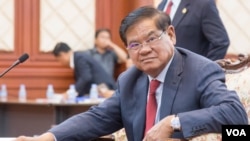In candid remarks, Interior Minister Sar Kheng on Saturday revealed that a huge influx of drugs was being smuggled from Laos into Cambodia as a result of loose border controls by Laos authorities.
Sar Kheng was speaking at a ruling party event in Kratie province on Saturday when he spoke about the province’s geographic proximity to Stung Treng province, near the Laos border – known as an infamous international drug trafficking route.
“When I held an annual meeting with them, I raised the number of drugs we confiscated which was carried from Laos,” he said, not providing details of this meeting with the northern neighbor. “They were surprised and appeared to express displeasure.”
In early March, Sar Kheng, who is also a deputy prime minister, visited Vientiane where he met his counterpart, Public Security Minister Vilay Lakhamfong.
“They, in turn, responded that it was because they confiscated so much [drugs] in Laos that there was this limited quantity of drugs being smuggled into Cambodia which, they said, should be regarded as fortunate by Cambodia,” Sar Kheng said.
“In fact, we have received information that [Laos authorities] would take actions if those drugs would be to distributes domestically [in Laos]. But if those drugs were heading towards Cambodia, they would just let it go.”
Sar Kheng’s comments on drugs crossing the border with Laos comes after he said drug usage and trade had been “spreading faster than the coronavirus diseases” in communities and rural areas across the country.
Meas Vyrith, secretary-general of the National Authority for Combating Drugs, declined to comment on Sar Kheng’s remarks, but acknowledged that the promises made about curbing the cross-border drug transport were in contrast to reality.
“If you look at the real practice, we notice more crackdowns and confiscations on the Cambodian sides and not so much on the Laos side, and we need further studies and verifications on the reasons why,” Meas Vyrith told VOA Khmer by phone.
Multiple calls to Laos embassy in Phnom Penh and Foreign Affairs Ministry in Vientiane went unanswered.
Laos has been a busy route for the “really accelerated” trafficking of synthetic drugs to northeast Thailand, Vietnam, and Cambodia, said Jeremy Douglas, regional representative of the United Nations Office on Drugs and Crime (UNODC) for Southeast Asia and the Pacific.
“The drug trafficking and use problem in Cambodia is not good – it's pretty bad. But more than the immediate situation, we are concerned it will get worse as organized crime groups appear to be looking to diversify and move some production and operations outside the Golden Triangle itself, and as trafficking continues to intensify to and through, possibly even from, Laos and Cambodia.”
Jeremy Douglas added that corruption was an enabling factor for the spike.
“We have no specific proof of collusion or pay-offs, but it is undeniable that corruption is very important for organized crime – they use it to advance their interests as they need to,” he said.
NACD secretary-general General Meas Vyrith admitted that there were cases in the past where some Cambodian police and military officers were involved in the drug trade, but said the government would deal with these officials with “zero tolerance” for “betraying their profession.”
Cambodia is in its fourth year of the so-called “war on drugs” launched in 2017, which has decried by human rights groups over corruption in law enforcement, the arrest of users, and overcrowding in the nation’s prisons.
According to NACD, as of August 17, authorities had confiscated around 682 kilograms of drugs, resulting in 13,460 arrests.




